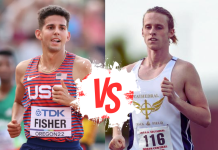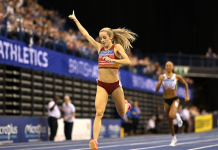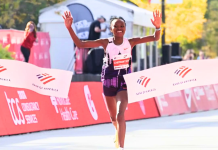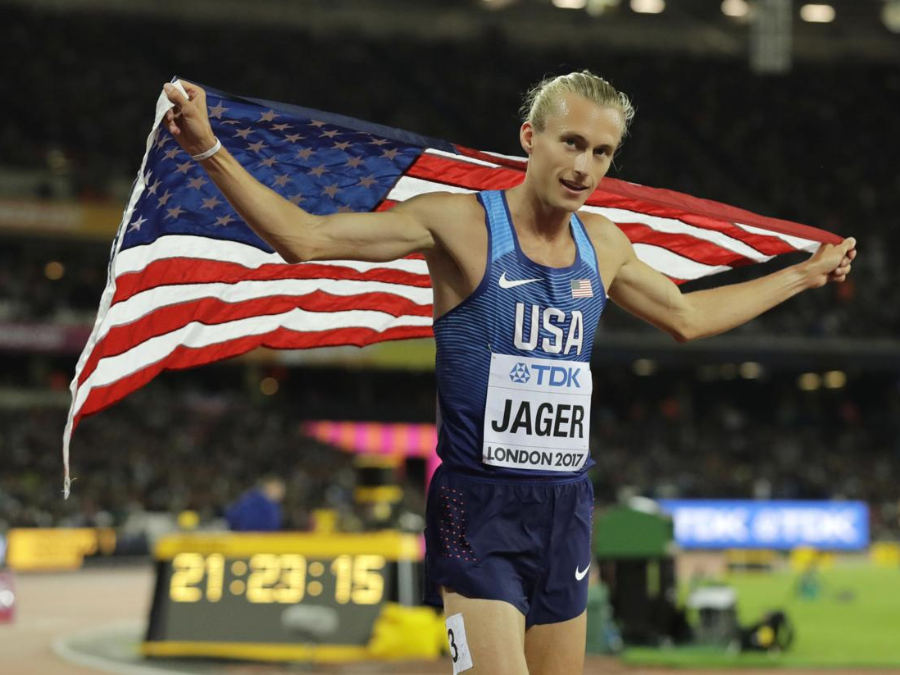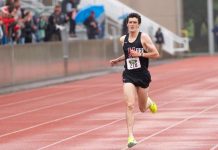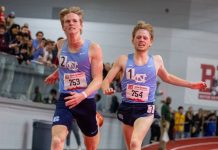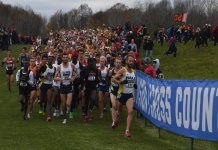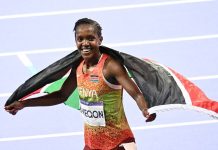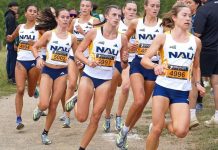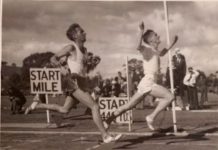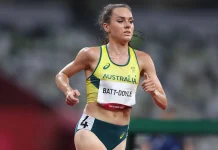In our RT Snap Q&A series, we’ve had the privilege of interviewing some of the world’s best runners, delving into their extraordinary journeys, celebrating their achievements, and exploring the unwavering dedication that defines their careers.
Evan Jager
- Born: March 8, 1989
- Nationality: American
- 3000mSC
Evan Jager, born March 8, 1989, in Algonquin, Illinois, is one of the most accomplished American runners in the 3000m steeplechase. Jager’s journey to the top began in high school, where he won four Illinois state championships, demonstrating his talent early on. After a year at the University of Wisconsin-Madison under Coach Jerry Schumacher, he left to join Schumacher’s professional training group in Portland, Oregon, marking the beginning of his elite career. This decision set the stage for Jager’s rapid rise in middle- and long-distance running.
View this post on Instagram
Jager transitioned to the 3000m steeplechase in 2012, where his natural aptitude for hurdling became evident. In his debut season, he set the American record with an 8:06.81 performance and finished sixth at the London Olympics. His career reached new heights in 2015 when he broke his own record, running 8:00.45 at the Monaco Diamond League. The following year, Jager secured a historic silver medal at the Rio Olympics, ending a 32-year medal drought for the U.S. in the event. He continued to shine with a silver medal at the 2017 World Championships, cementing his legacy as one of the world’s top steeplechasers.
While injuries have occasionally interrupted his career, Jager’s resilience and dedication have solidified his status as an icon in U.S. distance running. A seven-time U.S. steeplechase champion and a key member of the Bowerman Track Club, Jager’s influence extends beyond his performances. He has inspired a new generation of American runners to excel in traditionally challenging events. His journey exemplifies the determination and skill required to achieve greatness on the global stage
Personal Bests
- 4×1500 Metres Relay – 14:34.97
- 3000 Metres Steeplechase – 8:00.45
- 2 Miles – 8:14.95
- 2 Miles Short Track – 8:14.95
- 5000 Metres Short Track – 13:13.23
- 3000 Metres Short Track – 7:38.25
- 3000 Metres – 7:35.16
- 1500 Metres – 3:32.97
- 5000 Metres – 13:02.40
- 2000 Metres – 4:57.56
- 2000 Metres Short Track – 4:57.56
- Mile Short Track – 3:55.25
- Mile – 3:53.33
- 1500 Metres Short Track – 3:40.99
- Mile Road – 3:57.6h
- 10 Kilometres Road – 28:54
- 5 Kilometres Road – 14:12
- 600 Metres – 1:22.95
- 800 Metres – 1:50.10
- 1000 Metres – 2:20.39
RT: Your switch to the steeplechase in 2012 marked a turning point in your career. What inspired you to make that decision, and how did it shape the trajectory of your running journey?
Evan: I think the inspiration was a combination of a few different things. One of my high school coaches had told me that I should think about the Steeplechase when I went to college after messing around and high jumping 5’10” after practice one day, so that had kinda always been in the back of my head. Then in 2011, I was coming back from foot surgery and grinding myself back into shape, looking forward to the Olympic year and trying to come up with a plan with my coaches for how to get myself onto that Olympic Team. One of my coaches, Pascal Dobert, being a former Steeplechase Olympian thought I might make a good steepler, so we gave it a shot.
View this post on Instagram
RT: In one of the articles you are in, you’ve mentioned working with Jerry Schumacher as a key part of your journey. What makes his coaching style effective for you?
Evan: I think a major part of what worked so well between the two of us was that his expectations for you as an athlete were always extremely high and he pushes us athletes to an extremely high level. And I, as the athlete, had expectations and aspirations for myself that were also extremely high. I wanted to do everything right (almost) all of the time. (Gotta have a little fun sometimes lol).
RT: If you could relive any one race in your career, which would it be, and why?
Evan: If I were to just kinda be a passenger in my own body as the race was happening, it would absolutely be the Rio Olympic race. I would love to feel how it felt to run that kind of race again and then obviously, to feel the emotions of the finish and the post race.
RT: The 2016 Rio Olympics silver medal is a career-defining moment for many fans. What does that achievement mean to you now, and how has it influenced your future goals?
Evan: I think winning the silver medal at those Olympics just give me something that I can look at and be satisfied with, regardless of anything else that happened in my career. I think more than anything, it gives me something tangible to represent a sense of accomplishment that I had for working really hard for a goal that I had held onto for a long time.

RT: Consistency has been a hallmark of your career. What does a typical training week look like for you, and how do you balance intensity with recovery?
Evan: For most of my career, and now, I try to run 90-95 miles per week as much as I can throughout the year. Currently, we’re back to running 2 workouts per week with a long run. Over the years I’ve learned that if I have to take a day off for whatever reason, it’s better to pretend that day didn’t even happen and get back into the normal routine, instead of trying to make up the mileage over the upcoming days. My intensity/recovery balance has changed a ton over the years. When I was younger, I feel like if I wasn’t training or eating, I was sleeping or laying on the couch most of the time. Now that I’m a dad, my recovery time is mostly spent playing with my daughter, which I feel helps me to stay a little more mobile actually because I’m not just sitting in one place hours on end.
RT: You’ve been a role model for many aspiring runners. If you could go back and give your younger self one piece of advice, what would it be?
Evan: I honestly don’t think I would have changed much about my early days running. I really love how I got into the sport and how I approached it for most of my career. I think my advice would have come in around 2017 and I would have told myself not to get greedy and to stay with the consistency. In the 2018 season I started to up my mileage a little too much because I was trying to look for another thing to get me to improve more and it led to injury. I should have just stayed consistent and waited for the opportunities to come.
RT: What lessons from your journey as an elite athlete would you pass on to young runners starting out today?
Evan: Kinda just like I said, don’t look for any one thing to add to your training to take you to new levels. The best way to keep improving and find your limits is to stay consistent in training and all aspects of being an athlete.



